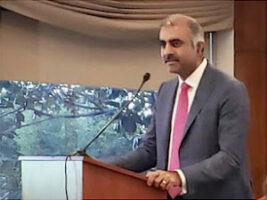In Part 1 of this blogpost, I had shared 14 Timeless Lessons from the Bhagavad Gita. In this note I have tried to connect the implications of the lessons of Bhagavad Gita for Business leaders, how it can address the key challenges arising from the existing business paradigm and provide a new, more positive and sustainable paradigm for business leaders.
It is increasingly clear that the current business paradigm is not sustainable, it has huge costs at all levels – individual, organization, society and the earth itself. Covid 19 has brought the unsustainable nature of our current models and approaches into sharp focus. If the current models are not sustainable then what is the answer? At first look, the paths of Spirituality and Business might appear divergent. However, deeper reflection and research has brought me to the conclusion that path to more sustainable business success is rooted in spiritual principles, and The Bhagavad Gita is an outstanding source of these spiritual principles. It is my submission that The Timeless Lessons from Bhagavad are not just consistent with business success but can lead to a more positive and sustainable success, for the business, for the society and for the individual. Applying the Timeless Wisdom from Indian traditions to the 21st Century problems is the golden formula!!
To test my hypotheses above, in addition to secondary research I have conducted interviews with a number of business leaders who have been influenced by Bhagavad Gita and have tried to apply the lessons both at an individual and organizational level. Overall, my attempt with this enquiry is to create a practical perspective that will find resonance with a business leader and can be applied in the Corporate world.
In the paper below, I will cover three topics:
- Today’s Business Paradigm – Core Principles, Attitudes, Merits and De-Merits
- Business and Bhagavad Gita are not at odds with each other – more convergence than divergence
- Gita can help address the fundamental challenges Business Leaders face today by providing a new Paradigm – a new attitude to life and to business
-
Today’s Business Paradigm – Core Principles, Attitudes, Merits and De-Merits
The dominant philosophy or paradigm today in the Business World is Capitalism. To progress on my enquiry, I first analyzed the core principles, attitudes, merits and de-merits of Capitalism.
Core Principles of Capitalism
There are 4 core principles of Capitalism:
- Private Property. The most important feature of capitalism is the existence of private property and the system of inheritance. An individual can accumulate property and use it according to his will. Government protects the right to property. After the death of every person his property goes to his successors (Pal, 2015).
- Free Enterprise. Every person is free to start any enterprise of his choice. People can follow the occupations of their ability and taste. Moreover, there is the freedom of entering into contracts. Employers may contract with trade unions, suppliers with a firm and one firm with another (Pal, 2015).
- Profit Motive. In this system, the desire to earn profit is the most important inducement for economic activity. All entrepreneurs try to start those industries or occupations in which they hope to earn the highest profit. Such industries as are expected to undergo a loss are abandoned. Profit is such an inducement that the entrepreneur is prepared to undertake high risk. Hence, it can be said that Profit Motive is the SOUL of the capitalist economy (Pal, 2015).
- Competition. A capitalist economy is characterized by free competition because entrepreneurs compete for getting the highest profit. On the other side buyers also compete for purchasing goods and services. Workers compete among themselves as well as with machines for taking up a particular work (Pal, 2015).
Attitudes of Business Leaders
The above core principles or objectives of Capitalism lead to the following attitudes and behaviors of business leaders.
- Results Orientation. Strong focus, even an obsession on meeting and beating targets. Quarterly earnings for the stock market, delivering to the Board, management commitments at all levels etc.
- Growth Drive. Value of the business is driven by its growth potential. So, there is intense motivation and drive for business growth
- Competitive Spirit. Win at all costs and survival of the fittest mindset. You win when you beat somebody, both at the level of business and individual
- Relentless Dissatisfaction. Not accepting status quo. Constant drive for efficiency and innovation
Merits of Capitalism
Capitalism is the most successful of economic systems that mankind has experimented with, perhaps because it most closely mirrors human nature. Some of its merits are:
- Economic Growth. Unprecedented economic growth and wealth creation. We can see how countries like China and India when they moved from Socialist to Capitalist models, the economic growth increased dramatically.
- Efficiency. Drive for continuous improvement both at organizational level and individual level. Helps reduce wastage and improve productivity
- Innovation. Dramatic advancements in science and technology and increasing pace of innovation. Innovation is an opportunity not only for businesses but entire societies to leapfrog
- Entrepreneurship. Unleashing of human spirit and potential. Encourage first-generation entrepreneurs to take the leap and build great businesses. In recent years, some of the wealthiest and most successful business leaders like Steve Jobs, Bill Gates, Jeff Bezos and Elon Musk are all first-generation entrepreneurs.
De-Merits of Capitalism
While Capitalism is the most successful economic system we know, it is not without its flaws. In fact, its problems are considerable and growing. Some of its de-merits are:
- Inequality. While Capitalism helps drive economic growth, the gap between rich and poor continues to rise. The resulting socio-economic divisions are dangerous creating a risk to peace and stability
- Unbalanced Growth. The constant drive for growth pushes companies and entire industries beyond natural limits. There is increase in consumerism, building of over-capacity and speculative behaviors. These result in the constant boom and bust cycles.
- Environmental Costs. The consequences of above unbalanced growth are disastrous for the environment. Over consumption and hazardous industrial activity have pushed the environment to such a brink, that we might never recover.
- Unethical Behaviors. Greed and desire for success pushes both organizations and individuals to unethical behaviors. It ranges from corruption to politics and self-serving behaviors at individual level
- Stress & Depression. Capitalism breeds a “Rat Race” and constant “One Up Manship”. You feel you are on a never-ending treadmill. This situation creates a lot of stress and anxiety and eventually depression and severe mental health problems in many cases.
Challenges of Capitalism have only been increasing with the growth of knowledge & technology driven economy and have come in sharp focus with the Covid 19 crisis. I believe Covid 19 is a big wake up call for mankind that we need to introspect and correct our systems and models. Limitations of the existing business paradigm are increasingly getting exposed and clearly there is need for a new paradigm, which is more sustainable and balanced.
-
Business and Bhagavad Gita are not at odds with each other – more convergence than divergence
In the above section we saw how the existing paradigm has severe limitation and the need for a new paradigm. The question is that can the timeless wisdom of The Bhagavad Gita provide the answers? I have always been very influenced by The Bhagavad Gita but also felt a gap between the paths of Spirituality and Materialism. However, with a deeper study of Bhagavad Gita, I have come to understand that the two paths are not divergent. It is possible to not only find congruence, but the paths can be aligned. In fact, greater understanding of spiritual values and methods, for which Bhagavad Gita is such a beautiful inspiration, can help in the achievement of the Material objectives, and in a more sustainable and peaceful way. It is not just possible to align your inner values and outer life, but doing so leads to greater happiness, fulfilment and well-rounded success.
I have felt a divergence between the concept of the “Complete Man” that Gita talks about and the profile of the “Insecure Overachiever” that I often see in the business world. Further, I have been concerned if Gita’s message of acceptance and surrender to Iswara takes one away from ‘Free Will’. And, whether this “acceptance and surrender” will limit us from effort, and consequently from realizing our human potential. However, upon deeper reflection I have realized that we do not need to see the situation in these terms. There is no argument against ‘Free Will’, or ‘Realizing Human Potential’, or ‘Growth’ in The Gita. In fact, Gita makes it clear in the following verses that the responsibility for one’s growth or fall is with yourself. Free will is the endowment that makes Moksha, or any accomplishment possible. It is uniquely developed in a human being. Moreover, Gita asks us to harness and hone our free will so that it is aligned with Dharma, putting us in harmony with the universe.
Verse 6.5: “May one lift oneself up by oneself; may one not destroy oneself. For the self alone is one’s benefactor (and) the self alone is of one’s enemy.”
Verse 6.6.: “For that (self) who has mastered oneself by oneself, the self alone is a friend of oneself. Whereas for the self who has not mastered oneself, the self alone remains in the status of an enemy, like an enemy.”
Gita talks about a number of concepts that are helpful and aligned with the core objectives of business:
- Desire per se is not bad. Desire underlies all action, only that you should not be obsessed with the results of your actions, which happens because of an awareness of Isvara and a commitment to Moksha.
- Artha (means, security) and Kama (gratifying the senses) are legitimate Purusartha, goals of human life (along with Dharma and Moksha). Artha and Kama are human objective anyway for the world; However, the beauty is to accomplish Artha and Kama through Dharma (the right way). Only that can lead to a sustainable world and eventually lead you to Moksha. Else, you will stay trapped in the cycle of Samsara.
- You have to follow your SvaKarma, your job, your mission. For example, it is legitimate to have building a great business as your mission. SvaKarma indicates that you have some innate characteristics, which have to be nourished and blossomed. This concept is the path to realizing your fullest potential.
- Kaushala implies continuous improvement, constantly sharpening your discriminatory powers to realize your potential as a fulfilled human being.
- Finally, Gita gives a clarion call for Action and not to desert your field of action. So, whatever your mission is, as long it is the path of Dharma, you have to follow it.
Therefore, it is now clear to me that is not about Spirituality Or Materialism, but it is Spirituality And Materialism!! Inner Values and Outer Values can be aligned, rather should be aligned. And, All material success, gained legitimately, is Isvara in the form of Lakshmi. It is a blessing and is meant for one’s own growth and the greater good.
- Gita can help address the fundamental challenges Business Leaders face today by providing a new Paradigm – a new attitude to life and to business
I have mentioned in the previous section that Gita’s teachings are not at odds with Business success. At the same time, Gita can be The Solution for the various challenges that beset Capitalism and the Business World today. Gita can help change your attitude, which happens because your understanding has changed, that can lead to more sustainable and higher-quality business and more personal growth, fulfilment and happiness.
I propose 5 changes in attitude that will be helpful for all business leaders and organizations:
- Froman approach of Obsession with Outcomes To Focus on Actions but Accepting results with Equanimity
There is an obsession with results in the business world, revenues, growth, profitability, market share etc. This obsession with results leads to not just stress and anxiety but often individuals and organizations to take the wrong means.We absolutely need to set goals at both the organization and individual level and give our 100% to the required actions. However, once actions are taken, we should accept results with equanimity. This concept is the spirit of Samatvam that Gita focuses so much on and is the core of Karma Yoga.The concept of acceptance is often misunderstood. It does not mean that you do not care about the outcomes or you do not do anything if you get an undesirable outcome. It means put in your best effort but accept the outcomes. You do that action-to-outcome tends to be a complex an equation so no point agonizing over it. Once you accept the outcome with equanimity it allows you to plan your next course of action with calmness.Benefits: Accepting results with Equanimity will reduce the frenzy and worrying, where we dissipate so much of our energy. This change in attitude will bring focus on the present moment and to us enjoying the process. With that you can have better quality of actions and therefore better outcomes. What’s more, this attitude leads to peace of mind! - Fromactions driven by Personal Gain and Ego To Spirit of Serving and Greater Good {Dharma}
As one expands one’s understanding of self from a narrow ego driven self to a broader, vast self (Atman) and realize that we are all connected and are actually one (Atman = Brahman), it will automatically change the “why” behind our actions. Our actions will move from being driven by narrow Personal Gain to Serving and for Greater Good. That is truly being rooted in Dharma, as Dharma is what benefits the most.Benefits: Actions aligned to Dharma will be fair and will lead to more sustainable growth and a more equitable society. This will result in happier organizations and healthier relationships. Moreover, this shift in attitude will also lead to more ethical behaviors. Also, once you are aligned with Dharma, certain laws of karma get activated which enhance outcomes. - Fromactions driven by Gratifying the Senses To Regulating/Mastering the Senses
Typically we are in control of our senses and the resulting likes and dislikes (Raag and Dwesha) drive many of our actions. It is imperative that we reverse this, instead of the senses controlling us (e.g., greed, anger, lust) we get regulate and master our senses. This change is about short-term pain for long-term gain. It will require great self-effort to begin with but once you get going, you will get into a virtuous cycle.Benefits: This shift will bring greater self-discipline, more ethical behaviors, and most importantly peace of mind. It is senses that when uncontrolled can throw us into a vortex of hankering and craziness. By controlling them we get a peaceful, calm, and clearer mind, exercise better judgment, and act more effectively. - Froma mindset of Competing To Abundance
Because of our narrow ego driven self, we are very focused on Competing and Winning. The ego driven self is insecure and always seeking to prove itself. As our understanding of Self grows, we start seeing the vast, infinite nature of existence. With that, our attitude shifts to that of Abundance, from dividing the cake to baking a bigger cake!!Benefits: As you move to an attitude of Abundance, you see the Bigger Picture, the greater set of opportunities. With that, there is greater collaboration and innovation. All of this leads to greater wealth creation. This attitude of Abundance is especially relevant in today’s technology disruption led business world, where it is very important to think fresh and see the bigger picture, and not be bogged down by a limited, competitive mindset. - Fromfocus on External World To Internal Reflection/Meditation
Business is very driven by the external world – the market, the competition, the stock market, the investors and so on. Many of these variables are not in our control and can lead to a high stress. Moreover, given the information age we live in, there are too many external signals and that can become very confusing. Gita and all Indic scriptures have from time immemorial presented a very different concept, that all the wisdom and knowledge is inside us and we can access that through Internal Reflection and Meditation. So, a shift from an Outside-In model to an Inside-Out model.Benefits: Benefits of Meditation are well known, and many business leaders already practice it. It leads to not only peace of mind but also clarity of thinking, deep intuition and higher creativity

From an understanding of the above change in attitudes and their benefits, it is clear that Gita can provide a new Business Paradigm. It provides both the vision and methods for a more positive and sustainable business and specific guidance for business leaders.
To make it even more tangible, Gita provides two very clear mental models for the above 5 attitudes: these are that of a Karma Yogi and Stitha Prajnya (man of steady wisdom). Moreover, Gita provides two inspiring role model for business leaders – Raja Janaka (whom I mention in Part 1 of this blogpost) and of course who other than Lord Krishna himself!!
Conclusion
I started the enquiry in this research paper with a personal dilemma – how do we move towards a more sustainable business paradigm and can The Bhagavad Gita provide the answers? Over the course of the recent study I did of Bhagavad Gita and writing this paper, answer has become very clear in my mind. Spiritual and Materialism do not need to be separate paths. It is about Spirituality And Materialism. Inner values and Outer life can be and should be combined. Applying the Timeless Wisdom from Indian traditions to the 21st Century problems is the golden formula!! Bhagavad Gita and the timeless wisdom from Indian Spiritual texts can provide a new business paradigm for the 21stcentury – a new vision and attitude, rooted in Acceptance/ Equanimity, Dharma (to serve, spirit of greater good), Self-Discipline/Mastering the Senses, Abundance and Internal focus. Such mindset and attitudes will definitely lead to more positive and sustainable business success, and greater fulfilment, happiness and personal growth for the business leaders. It is a great win-win and will lay the foundation for a more just, fair, peaceful yet prosperous society. Embedding this new paradigm is a tremendous opportunity but requires deep thought and a lot of effort on change management at multiple levels.
Om!!



